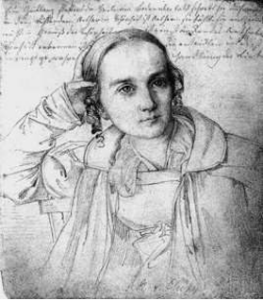Chorus of the spirits
(Poet's title: Geisterchor)
Set by Schubert:
D 797/4
for male chorus TTBB with horns and trombones[December 1823]
In der Tiefe wohnt das Licht.
Licht, das leuchtet und entzündet,
Wer das Licht des Lichtes findet,
Braucht des eitlen Wissens nicht.
Wer vom Licht sich abgewendet,
Der bewillkommt froh die Nacht,
Daß sie seltne Gabe spendet,
Ihn belohnt mit dunkler Macht.
Mische, sinne, wirke, strebe,
Mühe dich du Erdensohn,
Daß zu fein nicht dein Gewebe,
Und der Tat nicht gleich der Lohn.
Light lives in the depths,
Light, which enlightens and ignites,
Anyone who finds the light of light
Does not need pointless knowledge.
Anyone who has turned away from light
Cheerfully welcomes night,
Which offers rare gifts and
Rewards him with dark power.
Mingle, think carefully, be active, strive,
Make effort you son of the earth,
So that what you weave is not too fine
And so that what you do is not the same as what you receive.
All translations into English that appear on this website, unless otherwise stated, are by Malcolm Wren. You are free to use them on condition that you acknowledge Malcolm Wren as the translator and schubertsong.uk as the source. Unless otherwise stated, the comments and essays that appear after the texts and translations are by Malcolm Wren and are © Copyright.
☙
Themes and images in this text:
Ghosts and spirits High, low and deep Light Night and the moon Weaving
We may never know who these spirits were or what part they played in Chézy’s Rosamunde. The original libretto of the musical has disappeared and the revised version that was discovered and published in 1996 does not include this chorus, so it appears that Chézy decided to cut the scene after the first two (disastrous) performances.
The text itself leaves us in the dark. The first stanza seems to suggest that these spirits down in the depths still have access to ‘the light of light’ and that they possess more valuable and profounder knowledge than do most people up in the ordinary world of daylight. However, the rest of the text is about the power of rejecting light and embracing night. Since Rosamunde was first performed in the Theater an der Wien (in December 1823) Chézy may have been playing with the same ambiguities that run through Mozart and Schickaneder’s Die Zauberflöte, which had been premiered on the same stage a generation previously. There are elements of both the Queen of the Night and Sarastro’s ‘enlightened’ followers in this male chorus.
☙
Note: The libretto of Chézy’s initial version of her play, with the title Rosamunde, Fürstinn von Cypern, which was staged in 1823 in Vienna with Schubert’s music, is lost. This original version of the play comprises 4 acts. The manuscript of a revised version of Rosamunde in 5 acts has lately been discovered and published (Till Gerrit Waidelich, 1996). The Geisterchor (Chor aus der Tiefe) set by Schubert was omitted from the revised version.


